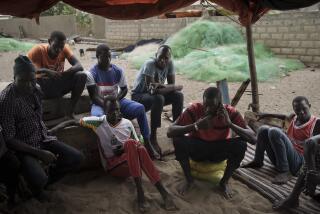Global Development: Spain was seen as welcoming refugees, but in North Africa it is cracking down

Late last August, 300 sub-Saharan migrants ran from the hills above this small Spanish enclave on the northern coast of Africa and stormed the 20-foot-high barbed-wire fence separating Spain from Morocco.
When 118 of them reached the other side, they hugged and yelped in disbelief. After journeying thousands of miles, after months of lying in wait in the forest for the perfect moment to cross, they had made it to Europe.
But the euphoria wouldn’t last. A day later, 116 of the migrants were deported back to Morocco. After mass crossings into Ceuta, the 7-square-mile Spanish city of 85,000 on the Strait of Gibraltar and a stone’s throw from continental Europe, Spain has cracked down.
Spain has put in place a policy of externalization of border control to the Moroccans.
— Virginia Alvarez, researcher at Amnesty International Spain.
Spain’s government, praised in the last year as more welcoming of immigrants than others in Europe, has partnered with Morocco to stop migrants from crossing its borders, or sometimes even approaching — prompting outcry from human rights groups.
“Spain has put in place a policy of externalization of border control to the Moroccans,” said Virginia Alvarez, a researcher at Amnesty International Spain. “And Morocco does not comply with human rights standards.”
The forests outside Ceuta where migrants once waited to cross are quiet; those who’ve made it into the city are laying low for fear of deportation. And in the northern Moroccan city of Tangier, migrants waiting to cross the Strait of Gibraltar tell of police raiding homes and packing people on buses to the country’s south.
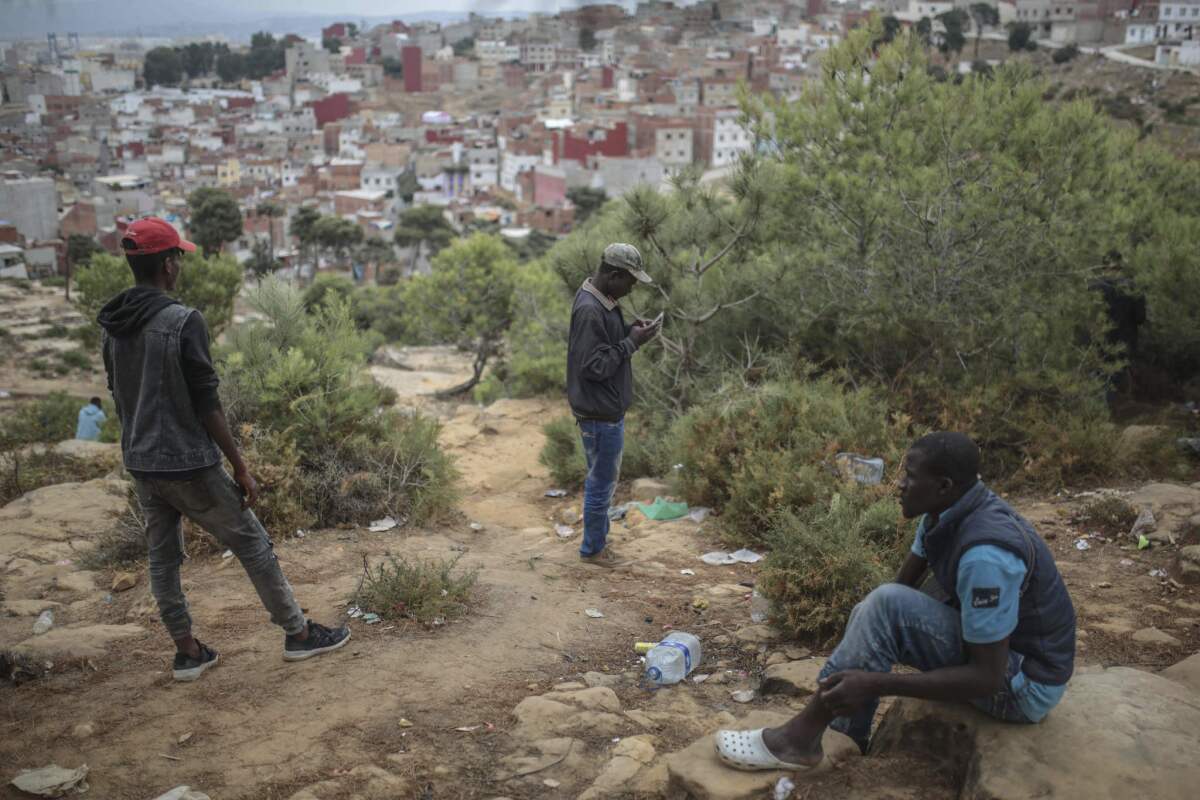
As historically high-migrant destinations including Italy closed their borders to refugees, Spain became the most popular route into Europe. Last year, 57,000 people crossed illegally into Spain, according to Frontex, the European Union’s border and coast guard agency — surpassing 23,000 crossing into Italy and 56,000 into Greece and Cyprus.
The surge in migration to Spain — including a boat holding more than 600 immigrants turned away by Italy and Malta in June — prompted the nation to open a temporary refugee camp in Cadiz.
But human rights groups argue that Europe and especially Spain, which has struggled to accommodate the new arrivals, are outsourcing border policing to Morocco.
Last year, the European Union pledged about $159 million to Morocco in order to contain migration into Spain. In 2018, Moroccan officials intercepted 89,000 attempts to illegally cross into Spain, according to the country’s interior ministry.
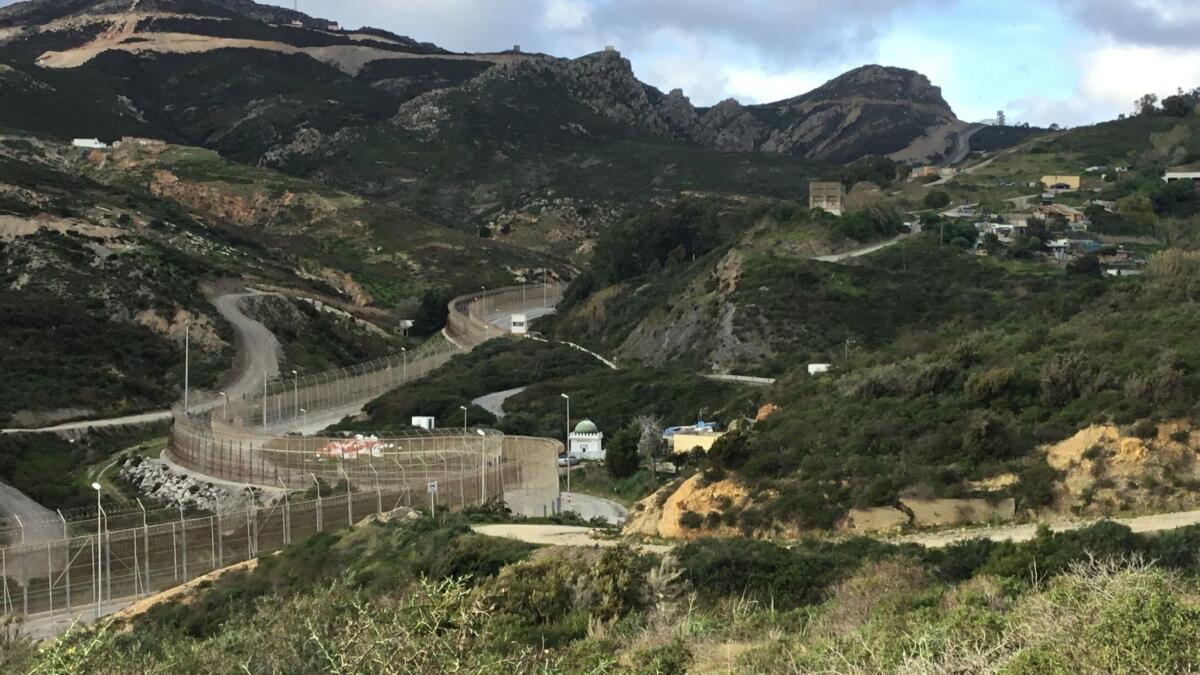
Morocco is building new encampments for officers patrolling its border with Ceuta, an autonomous city with its own government like Spanish regions such as Catalonia or Basque Country. The Moroccans work in tandem with the Spanish civil guard, which monitors the fence’s cameras and motion sensors to detect potential border crossers.
And across the country last year, Moroccan police swept up thousands of immigrants in home raids, according to data collected by Amnesty International.
In many cases, police send immigrants to the south of Morocco instead of back to their home countries.
“They’re treating them like they are their owners, like [the immigrants] are sheep,” said Santiago Agrelo Martinez, the archbishop of Tangier. “They can put them and take them wherever they want.”
Thirty miles southwest of Ceuta, in Tangier, five Senegalese immigrants share the bottom floor of a building in the quiet neighborhood of Souani. Every month, they pool $460 for the two-bedroom flat tucked away in an alley off a street lined with orange trees and restaurants.
Their living situation is unusual, said Cheikh Mbaye, who has lived in the flat for three years and plans to return to Senegal; many immigrants save their money to pay smugglers, and instead cram into smaller apartments with 20 or 30 other people.
Mbaye and the others chose to live in Souani because the risk of a police raid is lower compared with other neighborhoods.
“Each day [the police] come to break into the houses of the migrants who are here, to catch them and take them away to Tiznit,” a city in southern Morocco, said Mbaye, 30.
Lamine Diop, 25, sat on a faded red cushion as he recounted the four times he had been detained and sent to Tiznit. One early morning, police broke down the door to an apartment where he had been staying with more than 25 other immigrants. He was handcuffed, taken to a detention center, then bused to Tiznit. Then he headed north again.
Ndeye Marieme Diop, 28, who is not related to Lamine Diop, has also been deported several times. She lived in Saudi Arabia and Casablanca before paying smugglers 500 euros for a place to stay in Tangier while she waited to cross into Spain. Her father had died and she considered it her responsibility as the oldest child to find a way to earn money for her family, including her 7-year-old.
In October, police broke down the door of her apartment, and she, too was sent to Tiznit, she said. When she returned to Tangier, she met Mbaye, who offered her a more stable place to stay.
Both Marieme and Lamine Diop said they planned to pay smugglers for a boat trip across the Strait of Gibraltar, a nine-mile stretch where the meeting of the Atlantic Ocean and Mediterranean Sea creates powerful and dangerous crosscurrents.
Thousands attempted the crossing last year. Many didn’t make it. On Jan. 12 alone, 53 migrants drowned when their boat capsized in the Alboran Sea.
Immigrants are increasingly choosing a sea route to Spain, according to a government official in Ceuta not authorized to speak on the topic. Spain would not deport immigrants rescued at sea, the official said.
But the country is quick to deport immigrants when they cross by land. For years officials have used a controversial practice known as “pushbacks” to immediately return immigrants to Morocco from the two historically Spanish-controlled cities in northern Africa, Melilla and Ceuta.
In 2018, 1,977 immigrants arrived illegally in Ceuta, according to the Spanish government’s delegation in the city, a decrease from previous years.
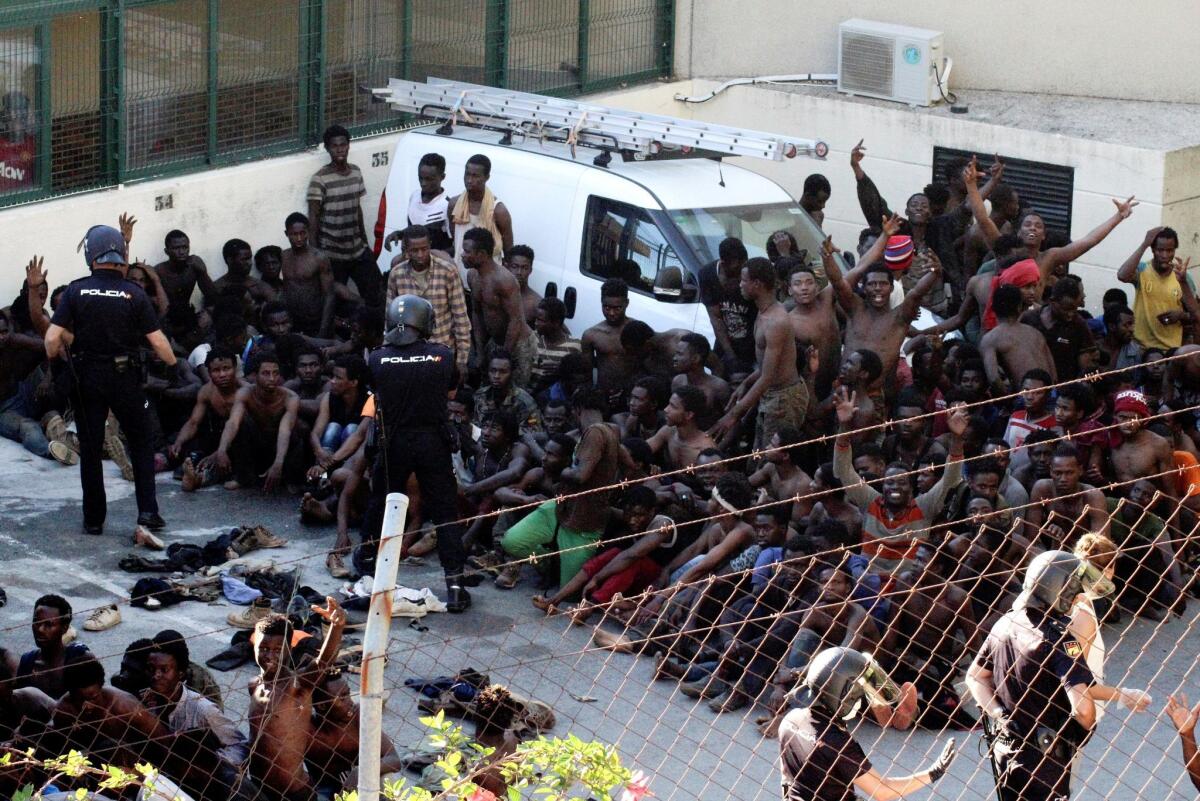
But after 800 migrants stormed the border in July, Spain reactivated a 1992 agreement with Morocco allowing for express deportations of migrants to their point of entry — effectively legalizing the rapid deportations already taking place. So when the 118 sub-Saharan migrants crossed the Ceuta fence in August, the policy was in place.
“They rarely have a genuine chance to apply for asylum,” said Judith Sunderland, associate director for Human Rights Watch’s Europe and Central Asia division. “The whole point of these readmissions agreements is a quick agreement for returns.”
Spanish officials say the migrants were told of the opportunity to apply for asylum but declined. The central government in Madrid received 100 applications for asylum in Ceuta last year, the majority from Algerians.
The Spanish government has defended its practices at the Moroccan border, saying the immigrants who tried to enter Ceuta in July and August were violent, throwing acid and quicklime at police at the border.
“Legally, it’s a very distinct situation from the migrants who we sometimes have to rescue,” Spanish Vice President Carmen Calvo said in August, calling what happened at the Ceuta border “unacceptable.”
Inside the city’s fences, Spanish officials are grappling with a different immigration problem: More than 300 unaccompanied Moroccans younger than 18 are estimated to live in Ceuta.
Some entered legally with their parents and stayed. Others hid under trucks or sneaked through the border with the thousands of Moroccans who cross into Ceuta each day to work.
Though they can stay at a crowded center for minors, many sleep between the concrete blocks of a jetty near the port.
A new proposal from the regional government of Melilla would give unaccompanied minors a deadline of three months before they are sent to their home countries or to other immigrant centers in Spain. One evening, standing on a curb near the port’s western wall, a group of Moroccan immigrants discussed the proposal, worried a similar one could take effect in Ceuta.
Taufek Liaduni, 17, said he wanted to get out of Ceuta as soon as possible. Taufek dropped out of school at 14 and was unable to find work in Tétouan, his hometown. Two months ago, he crossed into Ceuta underneath a trailer, clutching its metal underside and breathing in fumes for an hour as it idled in traffic.
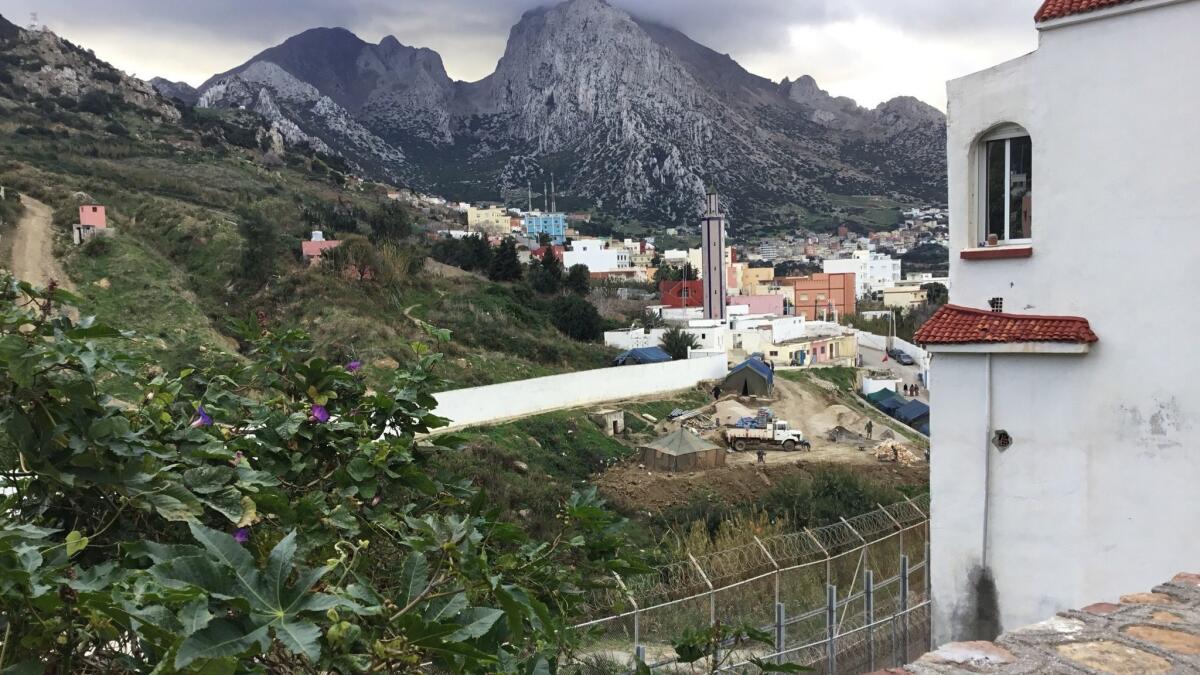
He sleeps under the jetty, braving the cold sea air and the occasional rat that scrambles into his sleeping space. During the day, he wanders the city center asking for food and money. By night, he stakes out the port, waiting for the perfect moment to clamber over into a boat bound for the Iberian Peninsula.
“There’s no other way,” Taufek said.
Some of the city’s residents complain about the immigrants and unaccompanied minors. Posters on the 3,000-member Facebook group “Citizen Insecurity Ceuta” accuse immigrants of committing crime and call for tighter border security.
But some in Ceuta are more sympathetic to the immigrants.
Jose Berrocal lived on his family’s farm at the border with Morocco until he moved into the city center five decades ago, when he was 15 years old. Back then there was no border fence, and people wishing to cross the border could do so easily.
Now, he said from behind the counter of his tobacco shop, everything has changed. His cousins still live on the farm, near where the migrants stormed into Ceuta in August. Spanish civil guard members patrol the road leading to the farm, and no unauthorized visitors are allowed.
Berrocal spoke of the migrants as he handed a customer change: “They’re just trying to find a way to make a living. I understand that.”
Bernhard is a special correspondent.
More to Read
Start your day right
Sign up for Essential California for news, features and recommendations from the L.A. Times and beyond in your inbox six days a week.
You may occasionally receive promotional content from the Los Angeles Times.

